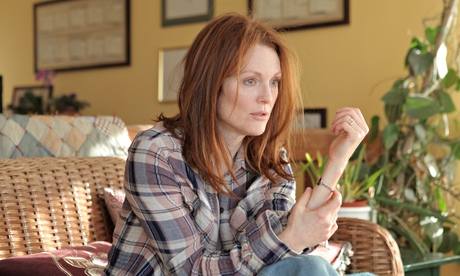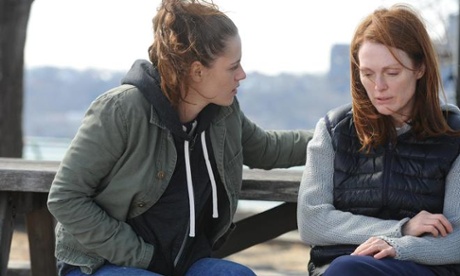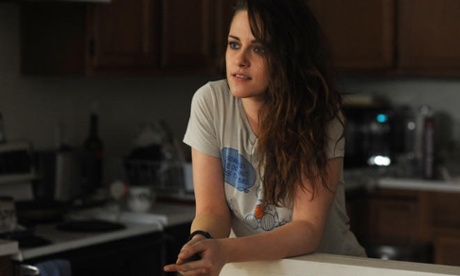
Still Alice: you gain awful insight into a fate whose horrors its sufferer appreciates, despite word games and bright positivity. Photograph: Handout
The final furlong of the Toronto film festival and, just as the delegates head home after 10 days through the emotional wringer, Julianne Moorebids them goodbye with a Glasgow kiss. To call Still Alice a weepy would be to underestimate the upset it elicits. It's a sucker-punch that smacks sufficiently hard you have trouble breathing. There were so many sniffles at my screening I suspect they're still mopping the floor.

Moore is Alice, a popular, much-respected 50-year-old linguistics professor at Columbia who lives happily with husband Alec Baldwin, also a neuro-specialist, of sorts. They've three grownup children – Kate Bosworth, Kristen Stewart, Hunter Parrish – and everything to look forward to. But small acts of forgetfulness lead her to seek medical help, fearing cancer. The diagnosis of early-onset Alzheimer's takes them both aback; likewise the news that it's genetic, and likely to be passed on to their children.
Film-makers Richard Glatzer and Wash Westmoreland, adapting the bestseller by Lisa Genova, then track the rapid progress of the disease and its fallout for the family, as some try to dodge responsibility, others to defeat the unbeatable. We stay close to Alice throughout; at times entering her vision - image blurred, context distorted, sound edit frightening - but mostly studying Moore's face as the light fades from it. You gain awful insight into a fate whose horrors its sufferer, for a while at least as she attempts to stymie the disease with word games and bright positivity, appreciates.
Film-makers Richard Glatzer and Wash Westmoreland, adapting the bestseller by Lisa Genova, then track the rapid progress of the disease and its fallout for the family, as some try to dodge responsibility, others to defeat the unbeatable. We stay close to Alice throughout; at times entering her vision - image blurred, context distorted, sound edit frightening - but mostly studying Moore's face as the light fades from it. You gain awful insight into a fate whose horrors its sufferer, for a while at least as she attempts to stymie the disease with word games and bright positivity, appreciates.
Glatzer and Washmoreland have teased one thread from the book further, brought it a touch more up to date (it's set a decade back). Just as Glatzer's own diagnosis with amyotrophic lateral sclerosis in 2011 has led him to speak only via an app, so too Alice's reliance on new technology impacts on her illness: after all, she has instant access to a bank of memories.

Might her smartphone use have even masked the depth of her memory loss? With neat little teases like these, the film's scope is expanded from the personal to the universal; even the dystopian. Alice uses her iPhone to write questions to herself which she must answer every morning, leading to scenes of pathos you didn't know autocomplete could manage.
It's not perfect – or, rather, it is a little too perfect. That Alice's profession concerns cognitive function over-eggs the pudding, adds to the unhappy sense that the tragedy of Alzheimer's is heightened when it hits an intellectual. Making the disease genetic as well as so early – and especially as Bosworth announces her intention to have a baby – also feels unnecessary. All you need is Moore; you don't need seven layers of irony to perk things up.
It's not perfect – or, rather, it is a little too perfect. That Alice's profession concerns cognitive function over-eggs the pudding, adds to the unhappy sense that the tragedy of Alzheimer's is heightened when it hits an intellectual. Making the disease genetic as well as so early – and especially as Bosworth announces her intention to have a baby – also feels unnecessary. All you need is Moore; you don't need seven layers of irony to perk things up.
But it's hard to deny the flooring impact of that central performance; a word too for Kristen Stewart, initially bratty, but developing into something much subtler. Alice quotes Elizabeth Bishop's line: "The art of losing isn't hard to master". This is an effortlessly excellent film, about a horribly hard subject.
Download
Part 1
Download
Part 1